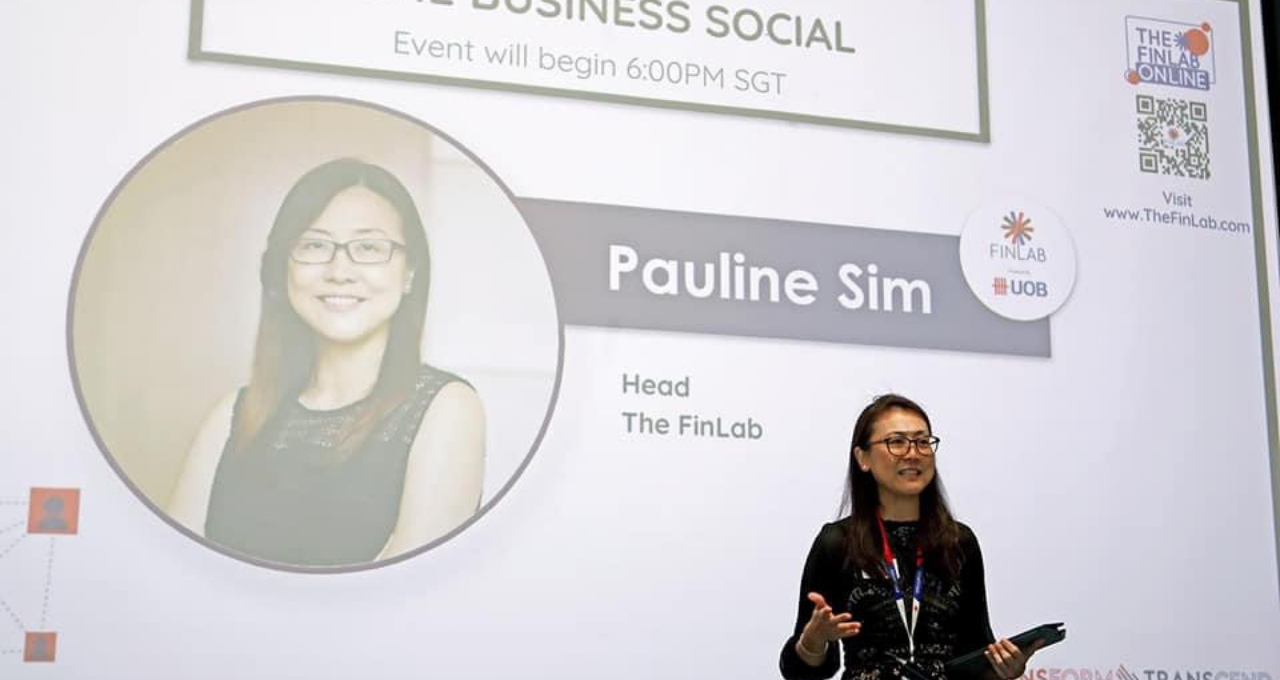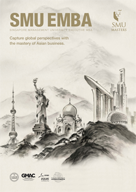
For someone who feels that lifelong learning is in her DNA, Pauline Sim admits she was not always, in her own words, a “model student”. The Dean’s List Honouree and Class President of the 2020 SMU Executive MBA cohort recalls constantly challenging what she was taught in her early school years. Despite going against the grain of traditional learning in her youth, she always possessed an innate thirst for knowledge and fresh insights.
“I’m sorry to say it but when I was in school, my teachers never saw me as a model student,’ she laughs. “Keeping quiet in class (would have been seen as being an) ideal student. I was definitely the type who was always curious and asking questions.”
One of the ways she sates this thirst for curiosity is by continually breaking out of her comfort zone. Most notably, after having spent almost 20 years of her life in banking, Pauline saw fit to move out of her tried and tested environment, joining business solutions start-up Sleek, in February this year as the Head of FinTech and Strategic Partnerships.
Despite being with the company for only over a month, she has already put out roots and feels at home in her new role, navigating exciting challenges and coming up with banking and financial business solutions to serve clients.
“The Fintech scene was rather nascent when I moved into the Fintech space in late 2015, but banks like UOB and our regulator MAS were already looking at how FinTech solutions’ impact on banking and finance,” she recalls. “So I benefitted from the early exposure of working with tech start-ups.”
She was referring to her previous role as part of the founding team of four at The FinLab, an innovation accelerator programme that was founded by United Overseas Bank (UOB). Pauline shared that the entity operated very much like a start-up, with a very small team. Being a part of the FinTech ecosystem, working with fellow tech start-ups, and venture capitalists (VCs) allowed her to first witness how tech start-ups work, an experience that she enjoyed and sought out.
“It was this exposure that led me to feel that there's a lot that I can contribute, create, and also build within a start-up space,” said Pauline. “Things definitely move faster (in a start-up). The kind of timelines we work with are in days and weeks. That experience made me realise I enjoy the pace and the ability to drive impact.”
This prepared her for her role in Sleek, where she is in charge of building the Fintech business as an extension of Sleek’s core services.
“Sleek started as a digital platform that offers corporate secretary and accounting services in a hassle free, efficient and price-transparent way, to newly set-up businesses and growing businesses. Hence, this opportunity in Sleek is super exciting as it allows me leverage on my SME banking experience and build innovative Fintech solutions to help solve the SMEs pain points. This enables us to keep building and bringing value to our SME clients.”
Lateral learning vs climbing the corporate ladder
Going the route of a generalist was perhaps ironically what allowed Pauline exposure and opportunity for her future successes. Even in her earlier days in banking, she had started out first in managing SME mortgage loans before moving on to bancassurance for SMEs, cross border businesses and strategic partnerships, among others.
“(At FinLab) I had the opportunity to cover very broad areas at a time when in banking and finance, everybody was very specialised,” she shares. “The ability to kind of go laterally and work with people across domains and have a broader viewpoint was not so widespread back then.”
Such coveted exposure turned out to offer great lessons for Pauline and an eye-opening journey of learning. It was through such experiences that she discovered her innate desire to always see beyond the narrow scope of any role she plays and became a natural driver for her career.
Her belief is that to stay relevant and be of value to whichever company or whichever community, it is imperative for individuals to build their own value.
“I've always been very curious about things. So that was the reason why I moved around,” she explained. “I don’t like remaining comfortable in the same role; the world is changing very quickly. Discovering new things, building things; whether it is a team, or a business is what makes me stay up at night and get out of bed in the morning.”
However, Pauline is quick to point out that she does not deliberately embrace lifelong learning for its own sake but also because of what she has observed and have overcome in the workplace.
“Throughout my career, I’ve been through two major financial crises and seen how when large corporations had to restructure, this usually involves looking at where the excesses which often lie in the senior levels of management,” she explains.
“This sense of fear is a very good motivator. Last year was a showcase of how things can suddenly change, and one could be caught unawares by not doing anything, and outdated or irrelevant skills can cause you to be left behind.”
Thus, she believes in the importance for everyone to constantly refresh not just their own skills, but even their perspective or thought process on how to see the world.
“I’m sure that every human wants to continue to be of value in their work life and to be appreciated regardless of their job,” she asserts. “To keep it that way, you have to invest time and energy to keep pace with the changing world.”
As a case in point, Pauline also ventured to launch her own start-up – an online wine platform called ClinxCo.com – together with 3 of her classmates in the EMBA class.
“It was actually one of our project works together during our innovation module. We considered applying new platform models and technologies that provide efficiencies and insights, to solve experiences in traditional industries. Of course, we started with our own pain points and observations in our wine appreciation, and decided the ideas borne out of the project were worth pursuing.
With Clinxco.com live and in its pilot run, it has reaped much learning and insights for her and her team. Unsurprisingly, this venture gave an entirely different dimension to the case studies done in class.
“It’s one thing to discuss a case but another to actually bring our ideas and thoughts to life and learn on the ground! I have found my own entrepreneur journey to be mutually value-adding to my work in Sleek – going through the pains of setting up business gives me an appreciation of what brings value to Sleek’s clients, at the same time I give a lot of respect to what the co-founders of Sleek has built; from the time they were just three, to our current team of around 180 staff in both Singapore and Hong Kong”.
EMBA in itself is not a secret formula for success
Pauline thought long and hard before pursuing the EMBA course at SMU as it presented both a heavy time and financial commitment. She initially considered an online course, which she thought would be “cheaper and more agile” and took up a module with another school but found it hard to stay engaged and disciplined in that mode of learning.
In 2019, after intensive research of all the local universities, she decided that SMU offered the best overall package for her. The fact that it was in town, had flexible scheduling and gave opportunities to attend business schools like Wharton helped her make her final decision.
“SMU was very supportive in bringing me on board, when I applied for and was awarded the Women in Leadership scholarship,” Pauline shared. “I felt comfortable engaging with the faculty from the beginning, till the educational session. The students that I spoke to from the cohort also gave good reviews of the faculty and programme.”
As a graduate of the EMBA programme, her key takeaway is that the course is not about applying a cookie-cutter approach to business problems with a “secret formula”.
“It’s not like if you apply what you learn, then you get the results,” she said, repeating an anecdote from her online graduation speech last year.
“EMBA is about equipping graduates with different tools, to view something with different lenses.”
Speak to our Admissions Advisors
Lee Kong Chian School of Business
Postgraduate Admissions
Singapore Management University,
SMU Administration Building
81 Victoria Street, Singapore 188065
Tel: +65 6828 0882
Join us at the upcoming events
Gf, Ramanashree Arcade, Kids Kemp, No 18, Mahatma Gandhi Rd, Craig Park Layout, Ashok Nagar, Bengaluru, Karnataka 560001
Via Gerolamo Cardano, 1, 20124 Milano MI, Italy
1 Raffles Drive, Makati Avenue, 1224, Makati City
